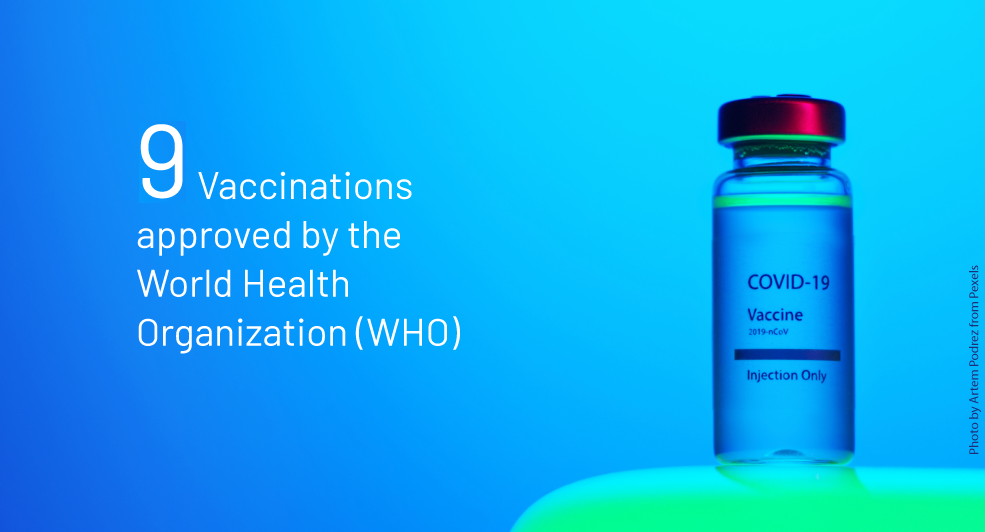9 Covid vaccines approved by the World Health Organization

Is your vaccine approved by the world health organization?
The world is in the midst of the second wave of COVID-19 and with the threat of a third wave looming at large. The positive news is that vaccines approved by WHO are available and can save millions of lives. The vaccine works by training and preparing the body’s immune system to recognize and fight viruses. After vaccination, if the body is later exposed to those disease-causing germs, the body can destroy them and prevent illness. Several safe and effective vaccines can prevent people from getting seriously ill or dying from COVID-19. This is just a part of managing COVID-19.
As of 12th January 2022, WHO has approved the following vaccines against Covid-19:
- AstraZeneca/Oxford vaccine
- Johnson and Johnson
- Moderna
- Pfizer/BioNTech
- Sinopharm
- Sinovac
- COVAXIN
- Covovax
- Nuvaxovid
The origin of the Covid-19 Vaccines approved by WHO:
The origin of Oxford–AstraZeneca:
The Oxford–AstraZeneca COVID-19 vaccine is sold under the brand names Vaxzevria and Covishield. This is a viral vector vaccine produced by the British University of Oxford, British-Swedish Company AstraZeneca, and the Coalition for Epidemic Preparedness Innovations. (Source)
Denmark and Norway, Slovakia, South Africa, Japan suspended the use of the Oxford–AstraZeneca vaccine. For detailed information on the suspension of the Oxford–AstraZeneca vaccination, you can visit https://en.wikipedia.org/wiki/List_of_COVID-19_vaccine_authorizations.
The origin of Pfizer–BioNTech:
The Pfizer–BioNTech COVID-19 vaccine is known as Comirnaty. This is an mRNA vaccine produced by the German company BioNTech and the American company Pfizer. In Hong Kong, Macau, and Taiwan, Comirnaty is distributed by Fosun Pharma. (Source)
The origin of Moderna:
The Moderna COVID-19 vaccine is also known as Spikevax. This is an mRNA vaccine produced by the American company Moderna, the U.S. National Institute of Allergy and Infectious Diseases, the U.S. Biomedical Advanced Research and Development Authority, and the Coalition for Epidemic Preparedness Innovations. (Source)
The origin of Janssen:
The Janssen COVID-19 vaccine is a viral vector vaccine produced by Janssen Pharmaceutica and Beth Israel Deaconess Medical Center. This is also a subsidiary of Johnson & Johnson but it is known as Johnson & Johnson COVID-19 Vaccine and as COVID-19 Vaccine Janssen. (Source)
Denmark, Finland, Norway and Canada discontinued the use of the Janssen vaccine. For detailed information on the suspension of the Janssen vaccination, you can visit https://en.wikipedia.org/wiki/List_of_COVID-19_vaccine_authorizations.
The origin of Sinopharm-BBIBP:
The Sinopharm BIBP COVID-19 vaccine is sold under the brand name Hayat-Vax, which is an inactivated virus vaccine produced by the China National Pharmaceutical Group (Sinopharm) and its Beijing Institute of Biological Products. (Source)
The origin of CoronaVac / Sinovac:
CoronaVac is an inactivated virus vaccine produced by the Chinese company Sinovac Biotech. (Source)
If the brand name of your vaccine and its origin is mentioned above, then your vaccine is approved by the world health organization.
We suggest that you take whatever vaccine is made available to you, even if you have already had COVID-19. You can discuss your situation with your health care provider:
- If you have a weak immune system.
- If you are pregnant or already breastfeeding, you should consider taking vaccination only after you stop breastfeeding.
- If you have a history of severe allergies, especially to any of the ingredients in the vaccine.
- If you are severely weak.
More evidence is required on the use of the different COVID-19 vaccines in children to be able to make general recommendations on vaccinating children against COVID-19. WHO’s Strategic Advisory Group of Experts (SAGE) has concluded that the Pfizer/BioNTech vaccine is suitable for use by children aged 12 years and above. Children aged between 12 and 15 who are at high risk can be offered this vaccine. Vaccine trials for children are ongoing and WHO will update its recommendations on the same.
Follow our blog for more health related articles and get in touch to book a test.
